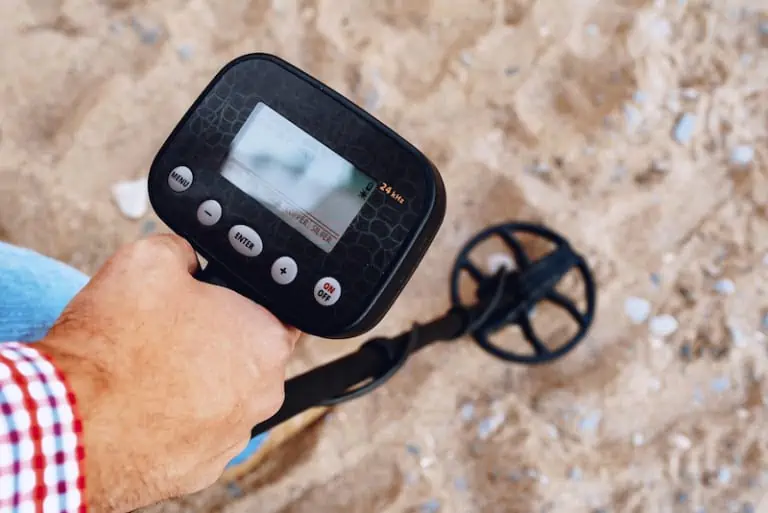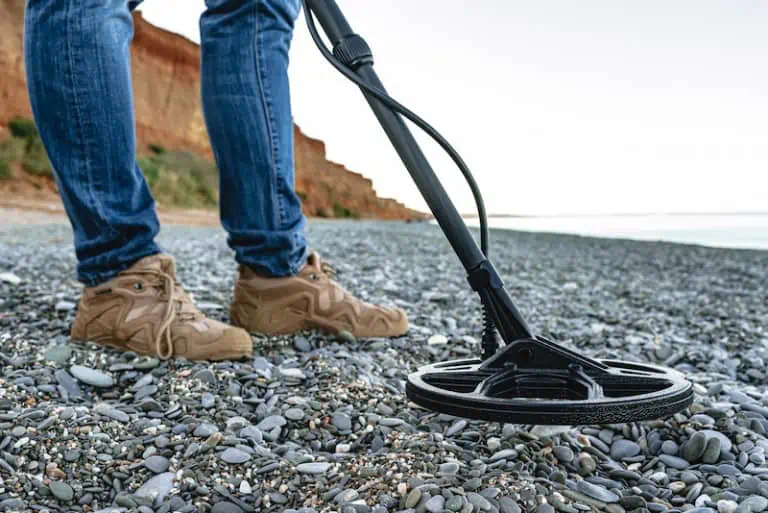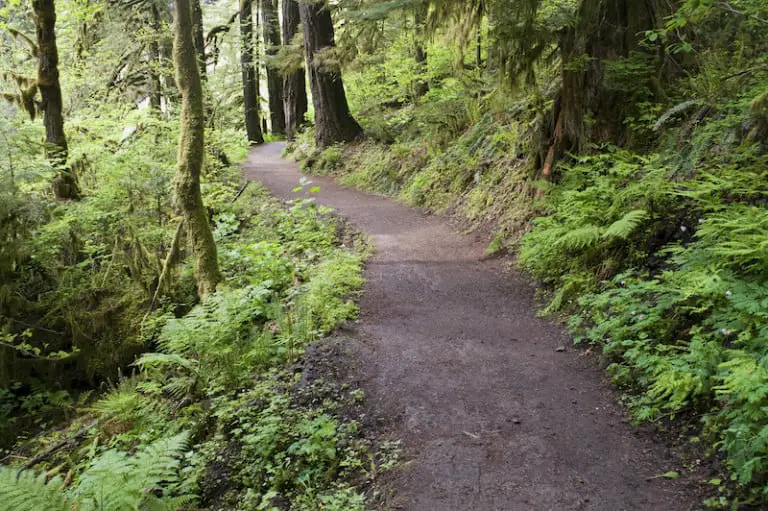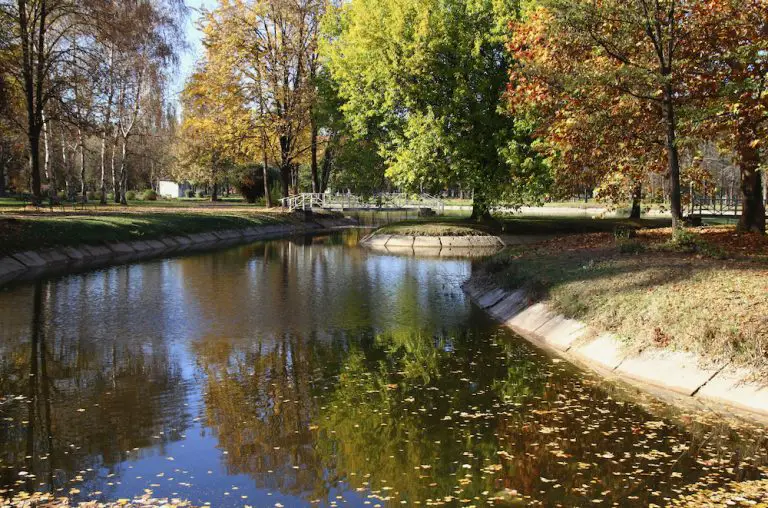Metal Detecting in Pennsylvania: Tips, Tricks, and Laws to Know
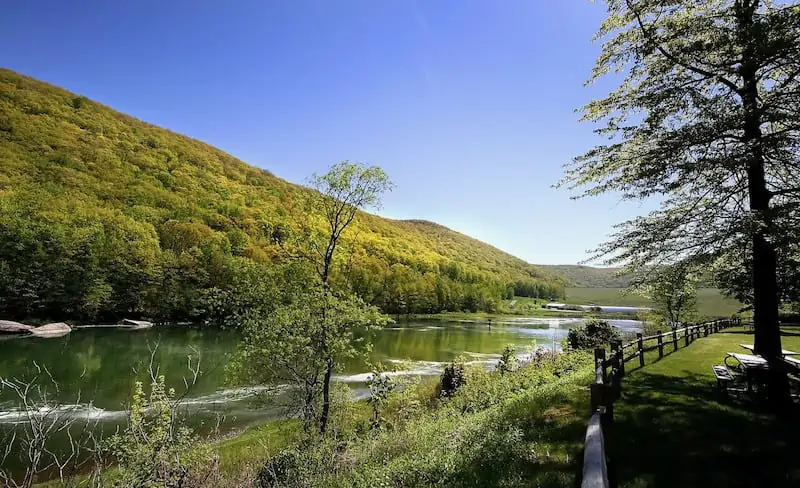
Pennsylvania has a long and rich history. This state is a great place to find buried coins and other treasures with a metal detector. There are many old settlements, towns, and parks where you can metal detect throughout Pennsylvania.
Many interesting artifacts have been found by detectorists in Pennsylvania including Civil War relics, Native American artifacts, and more modern coins and jewelry. There are even legends of buried treasures and caches throughout the state.
As with any other state, it is important to familiarize yourself with the laws and regulations for metal detecting in Pennsylvania.
Tips for Metal Detecting in Pennsylvania
1) Pennsylvania has some of the most flexible metal detecting laws in the country. Despite this, you must ensure you follow all laws and regulations to avoid fines and potential confiscations. As per all states, you must turn over any item over 100 years old or anything that may be historically or culturally important. These laws only apply to state, federal, or public lands, and do not apply on private property. Just ensure you have written permission to metal detect on private property and you can keep all the treasures you find.
2) You are not likely to strike it rich prospecting with your detector in Pennsylvania, but you can still have a whole lot of fun metal detecting for gold. The state is known to have a fair amount of placer gold, but it is not one of the main staples of the state. Check near old mines, or near areas that mine for coal and iron. Gold is a byproduct of other mining operations. You can also check near and in creeks in the state to find some buried nuggets.
3) Be sure you have the proper type of metal detector. Certain areas have different types of soil and not all metal detectors work well in all soil types. For example, areas with saltwater beaches will be difficult for a typical very low frequency metal detector as the saltwater is naturally conductive. When searching for gold, there can be a lot of interference from black sands and hot rocks. Gold is also a lower conductive metal, and some detectors struggle to find those nuggets. Whatever you are searching for in Pennsylvania, make sure you have the right detector, and you are familiar with its settings.
4) Try doing some research on the local area before you head out. Check with your local library for information on the locations of old settlements, old mines, river crossings, and settler’s trails. Because Pennsylvania has such a long history (in terms of American history, not so much world history), you have ample opportunity to find relics from the earliest days of European settlement in the US.
5) While you can metal detect in Pennsylvania state parks, you must ensure you do not disturb other recreators, or interfere in any way with the operation of the park. You must not disturb the landscape and refill all holes to their original status. You may only metal detect in state parks from the Tuesday after Labor Day until the Sunday before Memorial Day. This works to your advantage, though, as you can metal detect during the off-season. This means you can find all the treasures lost over the summer months and have less people to contend with.
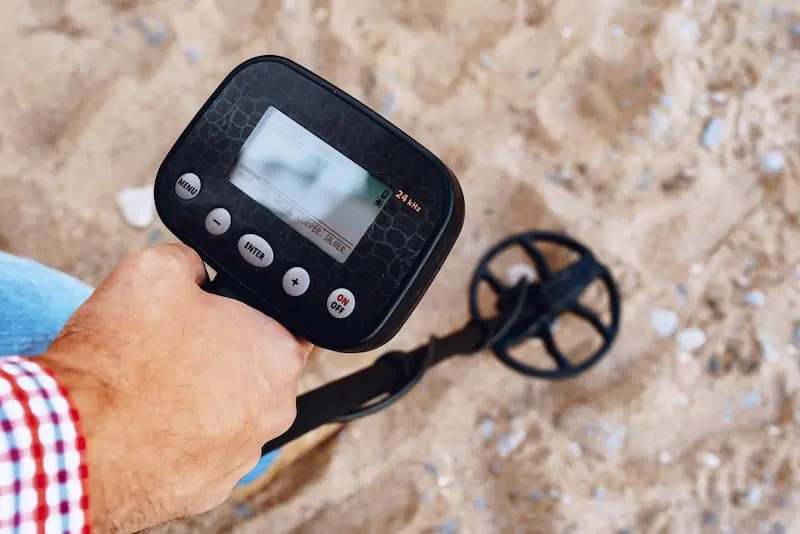
6) You may not use large digging tools while hunting in Pennsylvania state parks. This means you must ensure you have a quality tool of a reasonably small size such as a long screwdriver or other narrow pronged device. No full-sized shovels, spades, or trowels may be used. This is a good cause for bringing a handheld pinpointer, as it will narrow your search area down more accurately so you can dig a smaller hole. It can be quite tedious to dig a large hole with a hand trowel or ice pick.
7) Always dig all signals, especially if you are a beginner. Some signals are stronger than others, and the faint signals are easy to ignore. Do not ignore them! They can turn out to be amazing finds. Digging all your targets can help you better identify how your machine works and what different types of metals sound like. You will find trash. A lot of trash. And many of those iffy signals will be trash targets. Sometimes, though, that faint signal can turn out to be something amazing.
8) Always pack out all trash you find. Most metal detectorists have come around to the fact that we find more trash than treasure. While this can be frustrating and time consuming, packing out the trash you find leaves the area cleaner and healthier, and can make the next search easier for you. If you have searched an area and pulled out a bunch of pop tabs, soda cans, and nails, the next pass through may reveal coins and jewelry that were masked by the trash targets.
9)Try metal detecting in public areas with high traffic such as schools, playgrounds, meeting locations, and the like. Areas with high traffic mean the higher likelihood someone dropped something. Many cities will allow detecting within city limits. Again, make sure your city or town allows this and does not require a permit. When I lived outside of Boise, Idaho, my town did not require a permit. But the city of Boise did. Double check the laws in your town or city and follow them to avoid fines.
10) Always remember to an ambassador of metal detecting. Often, laws and regulations are put in place because of a few bad apples. If we do not follow the rules while metal detecting in Pennsylvania, or anywhere else for that matter, we can ruin it for everyone. Be respectful, courteous, and law abiding to ensure we can enjoy our hobby for years to come.
Tricks for Metal Detecting in Pennsylvania
1) Know your metal detector and your search coil. Many metal detectors are for all types of metal and all types of soil. However, not all are good at finding all metal types or in all soil conditions. Know the area you are searching in Pennsylvania and your detector to ensure your success. When you come upon a trashy site, use a smaller search coil (if your detector has the option to swap coils). Larger search coils will give you more depth and are great for when you have removed the trashy targets near the surface.
2) Hunt after rain. Rainfall can significantly change a landscape. It can uncover hidden items, wash away topsoil, and move items along its paths. Moist ground also conducts better so your metal detector may work better and deeper after it has rained.
3) If you can, find private property to metal detect on. When you detect on private property, you are not subject to as many rules and regulations. This means if you find a historical artifact, you can decide what to do with it. You may keep it, donate it to a museum, or turn it in to the authorities. It is at your discretion. It can be a lot more fun to hunt on private property knowing you can keep the little bits of history you uncover.
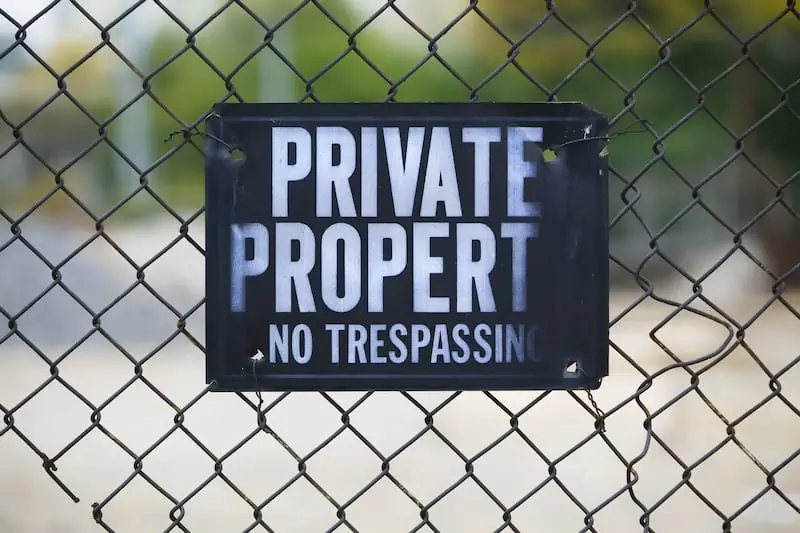
Make sure you receive written permission from the landowner, no matter how well you know them. This protects you in the event they decide your finds are their property and they do not want you to take them. You can decide with the landowner what happens to the finds, which should also be included in the written permission.
4) If you decide to prospect in Pennsylvania, make sure the metal detector you use is good for gold. Gold is found on higher frequencies when metal detecting as it is a lower conductive metal. Anything above 18 kHz is good for gold, but the higher the better. Make sure you have a good gold detector before prospecting to ensure you find all the gold you can.
5) When you search in areas where old settlements or camps were, make sure you can adjust your sensitivity or notch to filter out some of the junky targets. Or dig them all up. Whichever you prefer. Old homestead sites will have a lot of nails and other iron targets. You can use your notch discrimination to filter out some of these and make it easier to find good targets. Using the right metal detector, right search coil, and understanding how your settings work will give you the best chance at finding something fantastic while metal detecting in Pennsylvania.
Metal Detecting Laws in Pennsylvania
As with all states, Pennsylvania metal detecting is governed by the Archaeological Resources Protection Act. This Act is aimed at preserving historical and cultural artifacts. As such, no item of man-made origin over 100-years old may be removed from public grounds. If you do find something believed to be over 100-years old, or of historical or cultural significance, you must surrender the finds or risk heavy fines and confiscation.
Other metal detecting laws in Pennsylvania are some of the most flexible in the country. Metal detecting is allowed in almost all state parks (more on this later) and no permits are required. You must stay within what is considered “reasonable metal detecting.” The definitions of “reasonable metal detecting” are slightly murky, but most agree this means avoiding busy parks, fenced areas, and trespassing.
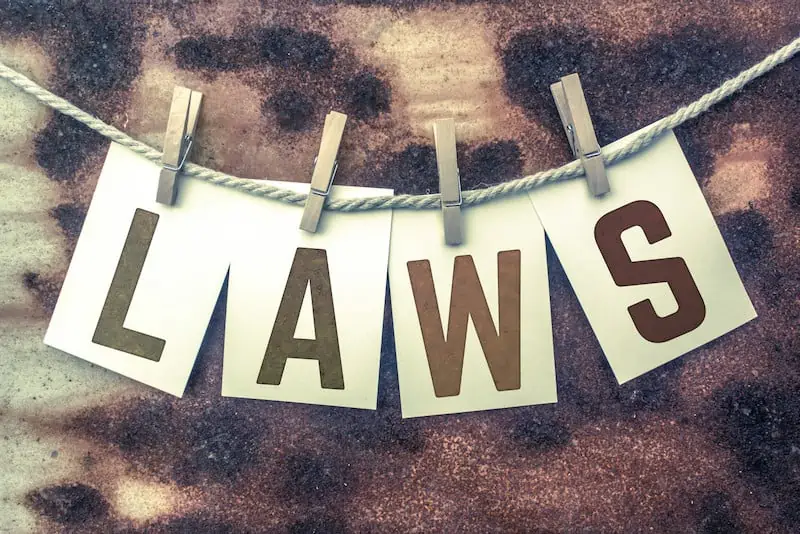
When metal detecting on Pennsylvania’s rivers and lakes, it is a little more complicated. You may use a metal detector on the shore of any water body between Labor Day and Memorial Day. Any time outside of this time period is at the discretion of the governing body of the lake or river to determine if metal detecting is allowed. This is likely to keep recreators and metal detectorists from clashing. That aside, you will be able to hunt on the beaches during off-season times, meaning you can find all the summer’s lost treasures.
Metal detecting on public lands is restricted to sunrise to sunset.
You may metal detect on Forest Service land in Pennsylvania, such as National Forests. There are limitations to detect in National Forests, however. You may not detect certain areas, and no prehistoric, historic, or archaeological resources may be removed or damaged. Legal activities for metal detectorists in National Forests in Pennsylvania include detecting on beaches or recreation areas to collect contemporary coins, jewelry, and other metal objects less than 50 years old.
If you receive a National Forest Special Use Permit, you may use a metal detector for mineral prospects, for archaeological survey, and for treasure trove searching. This is in line with the 1906 Antiquities Act. Without this permit, you may not dig or remove any object, or even collect any surface artifact over 50 years old.
Some city parks will allow metal detecting, while others forbid the activity. For example, Lancaster City Parks forbid metal detecting. Always check with the individual city and park to ensure you do not need a permit or to determine if metal detecting is legal within the park.
When metal detecting on private property, ensure you have written permission from the landowner. Written permission is always better than oral permission, as it gives you protection. When detecting on private property, you are not subject to the rules of the Archaeological Resources Protection Act and may keep artifacts over 100-years old when you find them. Do consider donating any important historical artifacts to museums or Native American tribes.
Metal Detecting for Gold in Pennsylvania
Like many of the states surrounding it, Pennsylvania has a fair amount of placer gold that left behind by glacial drifts thousands of years ago. You are not likely to find a huge lode vein of gold here, but there is plenty to keep a recreational prospector happy. The state is home to a thriving coal and iron mining industry. Many of the large iron mines in the southeastern part of the state have produced several thousand ounces of gold as a byproduct of iron mining.
The towns of Morgantown and Cornwall are great places to metal detect for gold. Placer deposits can be found in nearby rivers and creeks. The best-known placer mining locations in the state are York and Lancaster counties, but each county in Pennsylvania has the potential for some gold. Wyoming County is also home to several creeks known to contain placer gold.
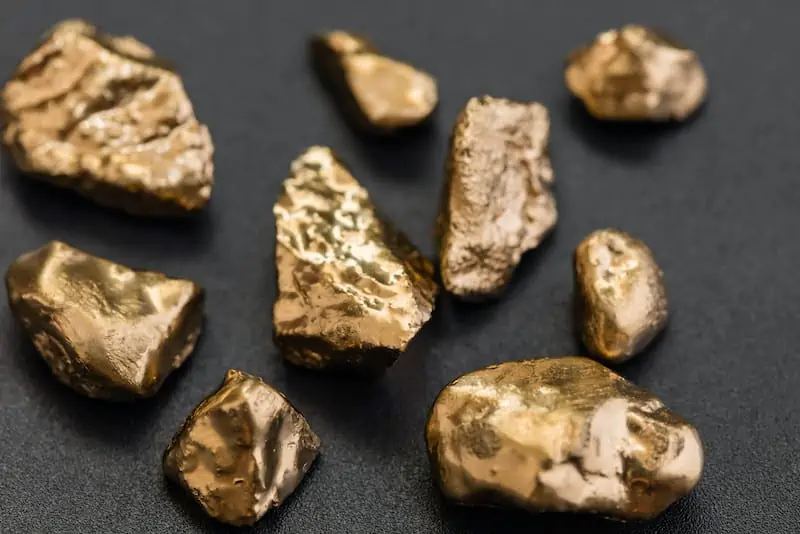
In Lancaster County to the east, search the town of Quarryville and the Susquehanna River and Peter’s Creek. Both have been known to contain gold and even small nuggets of platinum! Most of the gold in the northern part of the state was brought down by glaciers originating in Quebec and Ontario, Canada. The gold is often widespread, rather than concentrated in a smaller area. Be sure to explore new areas to find richer gravels.
One of the best places to search for gold is Elk County. The location of the legendary gold is not known, other than it is reported to lie in the northwest region of the state, meaning Elk County. Some believe this elusive gold lies within Elk State Forest. This area, however, is over 200,000 acres. You can also check places like Winslow Hill and Parker Dam State Park.
Best Places to Go Metal Detecting in PA
Aside from those listed above for gold prospecting, there are many great places to find treasure in Pennsylvania. Always make sure when you are detecting in a state park or national forest that you receive the proper authorization from the park managers. Although no permits are required, most areas require you to check in with the park managers before you begin detecting.
World’s End State Park
World’s End State Park is a scenic area in the eastern portion of Pennsylvania. Metal detecting near the river, especially areas where kayaks are launched, and the sandy shores, are great places to find lost treasures. You can also detect in the camping areas and along trails.
Tuscarora State Park
Tuscarora is over 1600 acres, also on the eastern side of the state. The Park is open year-round from dawn until dusk and is a popular destination for gatherings. This means there is a good chance of finding lost coins, jewelry, and other items.
Cowans Gap State Park
This Park is in southern Pennsylvania and has a 42-acre lake, beautiful cabins, hiking and much more. There is a concession area for buying food and snacks, so this area will be home to lost coins and jewelry.
Moraine State Park
Moraine State Park is a beautiful area with cabins to rent and beaches to play on. This is another great area to metal detect and find lost items and coins.
Ricketts Glen State Park
Ricketts Glen is a great place to search for native American artifacts. Relics from these early inhabitants have been found on the park grounds including weapons, tools, and pipes. The area is also known for European artifacts. Many of these artifacts will fall under the Archaeological Resources Protection Act, and therefore must be surrendered. But there are some newer finds in the area such as newer coins and jewelry.
Centralia Ghost Town
The state of Pennsylvania is home to many ghost towns. Centralia is one of the state’s best known ghost towns. It was originally settled in 1841 and expanded to house a post office, railroad, and several mines. Mining was the backbone of the town. Many of the mines began to fail and Centralia residents moved away from the area. A coal mine fire in 1962 destroyed much of the town.
The area is currently home to under a dozen residents. The area is overgrown and strewn with abandoned buildings. You may metal detect here with state permission. The remaining residents are passionate about their town and its history and are welcoming of respectful metal detectorists. You may even be allowed to detect on their private property, with written permission of course, and avoid following so many strict guidelines.
Pithole
Pithole was founded during the oil boom in northwestern Pennsylvania in 1865. Land was scooped up by many would-be oil barons and a town was built. 20,000 people called Pithole home by the end of 1865. Pithole was home to over 50 hotels, 3 churches, the world’s first oil pipeline, a newspaper, theater, and railroad. Pithole was known as a rough and tumble town, like those in the Wild West.
The town’s glory was short lived, however. By December 1866, just 2,000 residents remained, and by 1870, just 250. Today, it is an empty field near Oil Creek State Park. It houses a visitors center offering a look at the town’s history. Again, with permission, you can metal detect in this ghost town. Do not detect without written permission!
Allegheny National Forest
Allegheny National Forest is a great place for metal detecting. As mentioned in the previous section, you must follow all laws pertaining to the Archaeological Resources Protection Act and 1906 Antiquities Act when detecting in Pennsylvania’s National Forests.
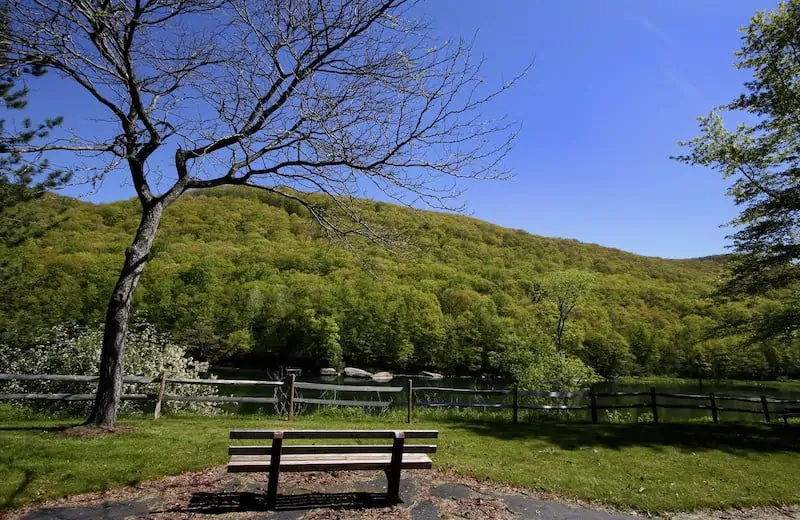
Allegheny is Pennsylvania’s only National Forest and was established in 1923. The forest is over 500,000 acres throughout Elk, Forest, McKean and Warren counties.
Metal Detecting Clubs in Pennsylvania
As with all states in the country, Pennsylvania has many detecting clubs. Joining these clubs can be advantageous for many reasons. You can learn new metal detecting skills, you can learn the rules and regulations of metal detecting, and you can learn from other metal detectorists’ experiences.
You will also meet people with a common interest, participate in club activities, keep up to date on metal detecting information, and be able to share your finds. Some metal detecting clubs in the state of Pennsylvania are:
- Beaver County Detecting Club
- Black Diamond Treasure Hunting Club
- Lancaster Research and Recovery Club
- Central Pennsylvania Rock and Mineral Club
- Metal Detecting Western Pennsylvania
- Southeastern Pennsylvania Historical Recovery Group
- Laurel Highlands Searchers
- Leigh Valley Treasure Club
- Penn Mar Historical Recovery Association
- Susquehanna Metal Detecting Club
Metal Detecting in Pennsylvania State Parks
Metal detecting in PA State Parks is allowed, so long as the activity falls within the “reasonable” use of metal detectors. Metal detecting is not permitted when the activity would interfere with a facility in use, nor is it allowed in fenced areas or swimming pool complexes. Metal detecting on beaches and lake swimming areas within state parks is allowed within a reasonable distance from shore from the Tuesday after Labor Day until the Saturday before Memorial Day, unless otherwise posted.
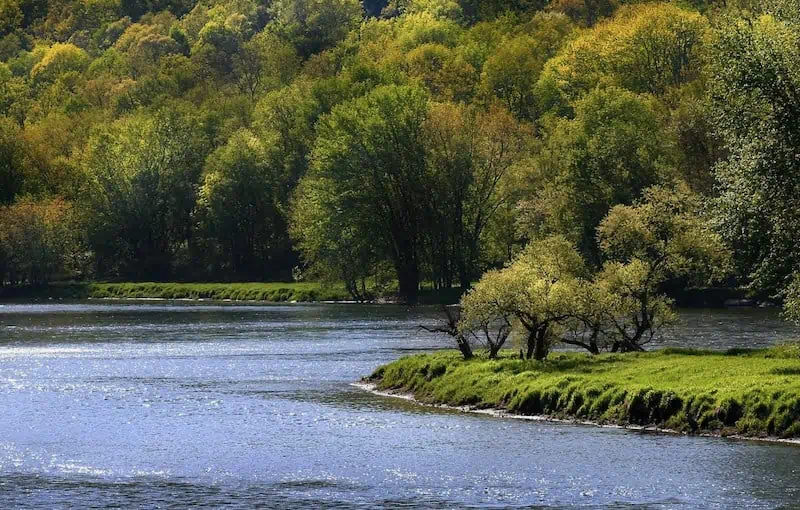
During summer months, metal detecting on beach and swimming areas can be done at the discretion of the park manager only. Metal detecting underwater is permitted, again, within reasonable distance of shore if it does not conflict with other activities or cause damage.
There are no fees associated with detecting in Pennsylvania state parks. Metal detecting can be done from sunrise to sunset. Digging tools such as shovels, spades, trowels, and other tools cannot be used in ground covered by turf, vegetation, shrubs or trees. Digging tools including screwdrivers, ice picks, and narrow, pronged devices are the only permissible tools.
If you find an object of historical importance, you must contact the park manager. You should also contact the Pennsylvania Historical Museum Commission. Prior to metal detecting in a state park, you must receive approval from the specific park manager on site and report items you find and intent to remove.
Metal Detecting Finds in Pennsylvania
There are many opportunities to find amazing items while metal detecting in PA. Treasure hunter Steve Barnes has found many relics from the 1700s and 1800s, including colonial coins, buttons, and Civil War bullets.
He has found 8 Reale coins from 1755 made of 92% silver, a 1794 George Washington inaugural button, and a 1700s button reading “Hail Columbia,” a national anthem predating the Star-Spangled Banner. Another detectorist, Bob Rynecki found a Rice and King emblem, which was a carriage maker in the 1870s.
The Keystone State is also home to numerous tales of lost buried treasure. In 1863, a Union Lieutenant was escorting a wagon concealing dozens of gold bars to Washington DC. They used Pennsylvania as a roundabout path. The Lieutenant was struck ill and let slip the secret loot the convoy was carrying. The group vanished before reaching the Susquehanna River.
One of the party’s guides turned up in Lock Haven and said they were ambushed. The gold was never found. A man named Dennis Parada and his son Kem met with the FBI and presented them evidence of the buried gold shipment. The FBI informed them that “if the gold’s there, it’s ours.” Despite this, it is still an amazing thing to find a cache of gold!
David “Robber” Lewis was a counterfeiter/thief in the 1800s who was a bit of a Robin Hood type. He would steal from the rich and give to the poor, essentially. He used caves and caverns to stash stolen goods. After being captured he wrote a memoir prior to his death in Bellefonte Jail.
He claimed he had many hiding spots still full of riches including $10,000 in a cave near Juanita River, another buried on Conodoquinet Creek, and one containing $20,000 in gold coins. None of the treasures were ever recovered and could still be out there waiting for a detectorist to find them!
Happy Hunting!
FAQ
Q: Can I find gold in Pennsylvania with a metal detector?
A: Yes! Pennsylvania is known to contain gold, albeit not a huge amount of gold. You likely won’t find a huge nugget or get rich while prospecting with your metal detector in Pennsylvania.
However, many of the creeks and rivers are known to contain placer gold and can be great places to search with your detector. I would recommend a good gold finding metal detector like the Fisher Gold Bug 2 when searching for gold.
Q: Can I metal detect in Pennsylvania State Parks?
A: Yes, with some exceptions. Metal detecting is allowed but not in areas where it may conflict with park operations or within any fenced-in swimming areas. Metal detecting in state parks can only be done from the Tuesday after Labor Day through the Saturday before Memorial Day.
It is up to each individual park manager during summer months whether you can metal detect or not. No permits are required, but they do ask you to check in with the park directors prior to detecting. Detecting hours are limited to dawn to dusk.
Q: Can I metal detect in Pennsylvania ghost towns?
A: Yes, if you have the proper permissions. Some of these ghost towns are considered historical places and may not allow detecting. Others are privately owned and will require you to obtain written permission from the landowner before you metal detect. If you do receive permission to detect on private property, you will be able to keep even old artifacts you find. Make sure you know who owns the ghost towns so you can ensure you are following all laws.
If you enjoyed this article on metal detecting in Georgia, please “like” our Facebook page and be sure to revisit Discover Detecting for new content surrounding the metal detecting hobby!
You Might Also Want to Read:
